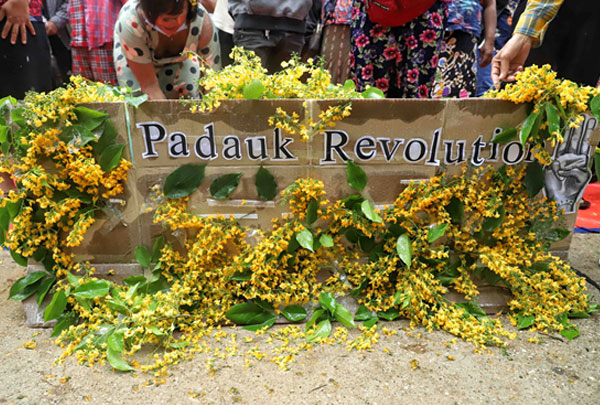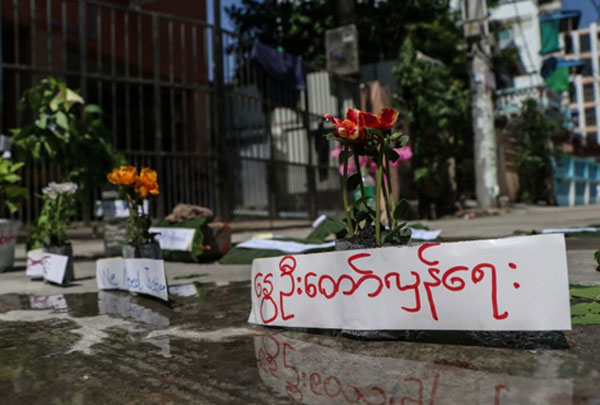From Gwangju to Myanmar
Hawam(Yeyint)

Three months has passed since the military coup occurred in Myanmar. Almost a thousand civilians were killed and thousands of those arrested went missing. The photos of arrested people, now posted on the Internet, are too horrendous to see. Those young people, who were once fresh and energetic, showed clear signs of tortures. The release of those pictures seems to be intended to instill fear in people but their hostility toward the military rather keeps rising. The military ruthlessly suppresses people on the streets and calls them a mob. Its excuses that the military is not to blame for their deaths is simply hard to understand. Even at this moment, unjustifiable suppression by the military and the police is still going on and people are expressing their will of defiance in many ways.
Despite the military coup, the international community has not been able to come up with a solution. Economic sanctions by the West, led by the US and the EU, may not bring expected results and what they had conducted thus far was just the adoption of a statement condemning the military. People of Myanmar are desperately hoping for the UN's Responsibility to Protect (R2P) to kick in and the deployment of the peacekeeping forces, but the UN's decision-making structure makes it hard to happen. Hence, we insist former UN Secretary General Ban Ki-moon should take an action at this critical juncture.
Myanmar faces such a grim reality that it has no one to rely on but should go it alone, which reminds me of Gwangju in May 1980 though I was not there back then. Had it not been for the courage of a German journalist, the chaos in Gwangju oppressed by the military junta would not have been made known to the outside world. Myanmar may be in a different situation than Gwangju which was left alone in the dark, since the status of Myanmar is reported in real time through SNS and people around the world send their support and cheers. I hope that the people of Myanmar can return to their peaceful daily lives as soon as possible.
Under these circumstances, the democratic camp declared the launched of the National Unity Government (NUG) on April 16. With that, the Committee Representing Pyidaungsu Hluttaw (CRPH), which served as a provisional government against the military, ended its role which lasted two months and a half and was disbanded. Some people expressed strong support for the NUG and, backed by people’s aspirations, the NUG has taken the first step on a rough and winding journey to restore democracy.
According to CRPH documents released on March 27, it seems the NUG would establish a new constitution based on federalism. Rather, Myanmar needs to build up strength to win the confrontation with the military. If it simply pursues an ideal future and did not give any attention to protests on the streets, the loss of innocent lives will keep rising and the power to restore democracy will be weakened. In fact, when monks took to the streets in 2007, the NLD led by Daw Aung San Suu Kyi barely made responses even though it is fair to say that the activities of political parties and politicians were placed under restrictions by the ruthless military regime back then.
Those protesters went to Daw Aung San Suu Kyi's house where she were detained then because she was a de-facto of the national leader. However, the NLD released a statement that it was a secular party and so could not join hands with the protesters, which was truly disappointing. Thus far, CRPH has issued more than 70 statements, but not a single statement mentioned condolence for the people who fell victim to brutal violence. People sacrificed their lives for the democracy of the country, not for the CRPH. It is regretful that the CRPH repeated the behavior of the NLD back in 2007.
Meanwhile, the NUG embarked on the creation of a "federal army" in order to fight the military(Tatmadaw) in solidarity with 18 ethnic armed groups across the country. Negotiations already showed 80% progress until early March and some people chose to join the army as they believed the current situation cannot be addressed with peaceful protests only. Ethnic minorities, which had chosen to be by-standers during the democracy movement that swept across Myanmar in 1988, currently show a change of stance in pursuit of a united entity and that suggests a positive prospect of a federal army. However, the size of those armed forces is too small compared to the military force’s troops (about 500,000 soldiers) and strong firepower. The total number of the potential federal army side combined is only 70,000 or so, and some of them even do not show interest in participating in the federal army.

Daw Aung San Suu Kyi once advocated non-violence, saying that if a problem is solved with violence, they will have to resort to violence every time problems arise in the future. After the democratization movement failed in 1988, some young men with determination left for jungle and created an army there, which did not last long. The NUG's argument that armed confrontation with the military is a last resort sounds plausible but who will take a responsibility for the loss of lives during a civil war, if ever? In late March, the Thai government sent back 3,000 refugees who crossed the border. A civil war will not be confined to a domestic issue but will inflict unexpected damages on neighboring countries.
Furthermore, it is hard to understand why those ethnic armed groups decide to join a federal army in pursuit of such a pure objective of democracy. They have been at loggerheads with the (military) government with claims on their political, economic and territorial autonomy and interests. It would put a civilian government, if ever, in a very awkward position if they demand the government should pay the “bill” after the war ends. If there are any chasms of confusion between them, the military would not waste time in intervening in politics again, and that is how and why the coup d'état took place in 1962. Hence, it is important that the NUG should find a way to prevent a civil war.
At the top of the NUG are President U Win Myint and State Counsellor Daw Aung San Suu Kyi, but both of them are now in custody. On the day of the coup, all 21 members of the Central Executive Committee(CEC) of the NLD were also detained and their whereabouts have been unknown to date. Under these circumstances, the NUG should be able to lead people as a united team and it should be free from interference by the NLD even after democracy is restored. Which means, they cannot afford power struggle within the democratic bloc. It should be noted that some of young people in Myanmar do not follow Daw Aung San Suu Kyi as their sole leader for the democratic movement. What they want is Myanmar's democratization, a future without a military regime and a genuine leader who listens to people's voices.
With Gwangju taking a special place deep in our hearts, we need to focus on the current situation of Myanmar. We should walk along Myanmar so that misfortunes can be prevented from happening in the future and Myanmar stay on course towards democracy. It is time now we need to pay attention and make sure the NUG does not go its own way apart from people’s desires. We should embrace Myanmar and keep it warm, so it does not become another, lonely Gwangju. Though Gwangju in May was sad and painful, Myanmar in May should blossom with peace and harmony.


